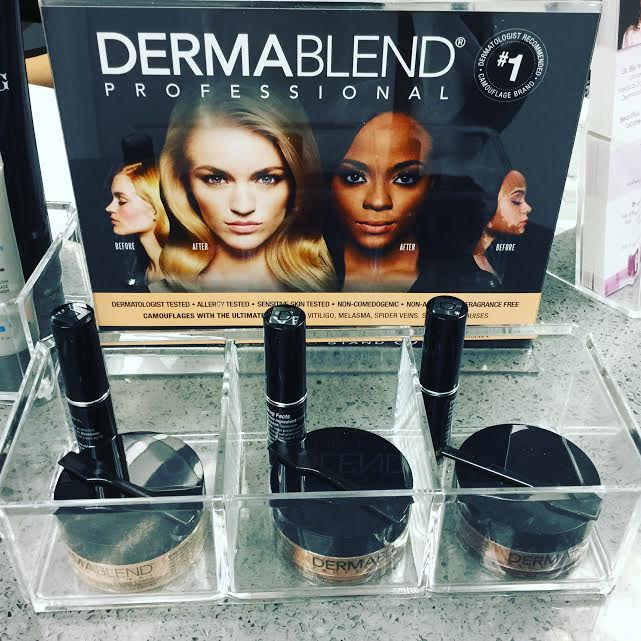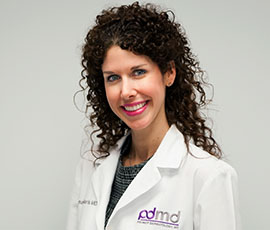Those hangy neck things
They're called achrochordons, or skin tags. They can be brown, tan, or skin-colored. And while they may be bothersome to the patient, they're actually totally benign. Skin tags are more common in middle-aged and older people, as well as in female and obese people - but anyone can get one.
Pregnant ladies may notice that they become larger or get more of them - which is normal. Since these are benign growths, they don't have to be treated - and insurance usually won't cover their removal. They can be snipped with scissors, burned with a little cautery, or frozen with liquid nitrogen. What treatment modality is used usually depends on location, the number of lesions, and the appearance of surrounding skin. Usually the tag doesn't return, but it doesn't guarantee that more won't appear. Just a caveat - it's always important to have a dermatologist check you from head to toe- they are the experts in deciding what is benign and what needs a biopsy. And any skin spot that changes, bleeds, or itches should be check right away!
So if those "hangy neck things" are annoying, see Dr. Bilu Martin at pdmd- a quick treatment can leave you "hangy neck thing" free!
Peel away time
Premier Dermatology, MD is a full-service dermatology practice in Aventura, Florida specializing in medical, cosmetic, and surgical dermatology.
Awareness
May is Skin Cancer Awareness month. In partnership with the American Academy of Dermatology, Dr. Bilu Martin was happy to perform free skin cancer screenings at Premier Dermatology, MD. But we believe that every month should be Skin Cancer Awareness month. Protecting yourself from the harmful rays of the sun should be a daily goal. Wearing sunscreen and reapplying every two hours, putting on sun protective clothing including hats, staying in the shade, and not tanning or burning are so important for your skin's health. Be on the lookout for spots that don't heal, new spots, or old ones that change. There are three main types of skin cancer: basal cell carcinoma (BCC), squamous cell carcinoma (SCC), and melanoma. BCCs and SCCs are directly caused by sun exposure and generally, do not spread beyond the affected skin. Melanoma is caused both by sun exposure as well as genetics. If melanoma is caught early, it is curable.
Do yourself a favor and have your skin examined by a dermatologist. Encourage your friends and family to do the same. And please, please, don't use tanning beds. According to the Skin Cancer Foundation, indoor UV tanners are 74% more likely to develop melanoma, the deadliest form of skin cancer, than those who have never tanned indoors. That's a big increase. And believe it or not, there are still plenty of people out there using tanning beds, despite all the info about how dangerous they are. Protect your and your loved one's skin - this month and every month.
Simple is Better
Sometimes skin care follows the "kiss" principle....
1. Soaking toenails in a mix of white vinegar and water can help improve nail fungus.
2. Duct tape can help warts disappear.
3. Crisco is a great skin moisturizer -especially for those with eczema.
4. Olive oil heals ragged cuticles.
5. Pressure stops bleeding.
6. Vaseline and a band aid heal wounds.
7. And the key to looking young? Sunscreen!
Oh- and laughing often, breathing, eating a healthy diet rich in antioxidants, using a retinol cream (not if pregnant or nursing), drinking water, exercising, and not sweating the small stuff. And sunscreen!
Who cares about makeup?
We do. And you should.
But any foundation or concealer will do, right? It doesn't matter, right?
Wrong. It DOES matter!
At Premier Dermatology, MD, we treat acne with a variety of prescription and office-based treatments - oral antibiotics, topical antibiotics, topical retinoids, topical anti-inflammatory creams, benzoyl peroxide and salicylic acid washes, chemical peels, deep-cleaning facials with extractions, hormone-based treatments, and even isotretinoin (accutane). Of nearly equal importance are the sunscreens, moisturizers, cleansers, and makeup that are used in conjunction with prescribed treatments. We carry hand-selected skincare products specifically chosen to compliment regimens. The wrong makeup can clog pores, increasing oil production and resulting more breakouts - the very opposite of what we are trying to treat.
That's why we are so pleased to offer Dermablend makeup to our patients. Their makeup is non-acnegenic, non-comedogenic, non-oily, and fragrance-free. And they really cover redness, pigment (melasma), lack of pigment (vitiligo) and scarring. The cover creme foundations also contain titanium dioxide SPF 30 sunscreen for extra protection. When paired with the setting powder, the makeup can stay on for 16 hours.
The quick-fix concealers are amazing. These potent little sticks are perfect for blending under-eye circles and bruising that can occur after filler injections. Use them to cover-up blemishes, skin discoloration, and uneven skin tone. Dermatologist tested and approved; be sure to ask us about Dermablend at your next visit at pdmd!

Categories
- November 2014 (1)
- December 2014 (3)
- January 2015 (4)
- February 2015 (3)
- March 2015 (1)
- April 2015 (3)
- May 2015 (4)
- June 2015 (2)
- July 2015 (0)
- August 2015 (1)
- September 2015 (2)
- October 2015 (4)
- November 2015 (1)
- December 2015 (1)
- January 2016 (2)
- February 2016 (1)
- March 2016 (3)
- April 2016 (2)
- May 2016 (1)
- June 2016 (1)
- August 2016 (1)
- October 2016 (1)
- January 2017 (1)
- February 2017 (1)
- June 2017 (1)
- August 2017 (1)
- October 2017 (1)
- December 2017 (1)
- April 2018 (1)
- May 2018 (1)
- November 2018 (1)
- May 2019 (1)
- July 2019 (1)
- January 2020 (1)
- March 2020 (2)
- July 2020 (1)
- November 2020 (0)
- January 2021 (1)
- October 2021 (1)
- January 2022 (1)
- June 2022 (1)
- November 2022 (1)
- April 2023 (1)
- September 2023 (1)
- September 2023 (1)
- December 2023 (1)
- February 2024 (1)
- July 2024 (1)
- September 2024 (1)
- March 2025 (1)
- October 2025 (1)
Archives
Latest on blog
The fountain of youth: collagen!
Published September 30th, 2025These days, everyone is searching for the elusive Fountain of Youth. But dermatologists know what...
Learn More
